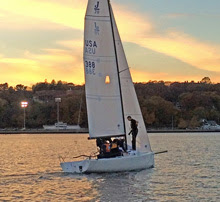 (New London, CT)- Imagine for a minute what it might be like to attend one of the coolest colleges on Planet Earth and be a member of its sailing team. One that has a unique educational, leadership and professional development program that teaches university-level students to devote themselves to selfless service to their nation and to humanity. One that has a mission to help protect people who use the sea as well as protect the sea itself for humanity.
(New London, CT)- Imagine for a minute what it might be like to attend one of the coolest colleges on Planet Earth and be a member of its sailing team. One that has a unique educational, leadership and professional development program that teaches university-level students to devote themselves to selfless service to their nation and to humanity. One that has a mission to help protect people who use the sea as well as protect the sea itself for humanity.It’s a noble undertaking to ensure the environment we live in is around for future generations to enjoy. Remember the words of one famous sailor, as American President John F. Kennedy once remarked during the 1962 America’s Cup summer in Newport at the Australian Ambassador's dinner, “I really don't know why it is that all of us are so committed to the sea, except I think it's because in addition to the fact that the sea changes, and the light changes, and ships change, it's because we all came from the sea. And it’s an interesting biological fact that all of us have, in our veins, the exact same percentage of salt in our blood that exists in the ocean, and, therefore, we have salt in our blood, in our sweat, in our tears. We are tied to the ocean. And when we go back to the sea - whether it is to sail or to watch it - we are going back from whence we came."
Located on the beautiful tree-laden banks of the Thames River in New London, CT, the U.S. Coast Guard Academy is the smallest of the American service academies. Despite its size, its impact on the world is far greater than anyone can imagine. The young men and women that ultimately lead the US Coast Guard after graduation are those who look after the tens of thousands of miles of America’s coastline (which include the Atlantic, Pacific, the Great Lakes and associated major rivers).
 As part of learning that mission, all cadets spend part of their first summer aboard sailboats experiencing Kennedy’s prophetic words about “committing to the sea”, to appreciate both its raw power and extraordinary beauty and why people feel so “tied to the ocean”. In addition to their fleet of college dinghies that sail spring and fall, the Academy has a tradition of offshore keelboat sailing and racing. Cadets have the opportunity to sail “college keelboats” around the buoys spring and fall and larger “big boats” offshore in the summer (like sailing their J/44 on the Bermuda Race, Block Island Race Week and New York YC Race Week).
As part of learning that mission, all cadets spend part of their first summer aboard sailboats experiencing Kennedy’s prophetic words about “committing to the sea”, to appreciate both its raw power and extraordinary beauty and why people feel so “tied to the ocean”. In addition to their fleet of college dinghies that sail spring and fall, the Academy has a tradition of offshore keelboat sailing and racing. Cadets have the opportunity to sail “college keelboats” around the buoys spring and fall and larger “big boats” offshore in the summer (like sailing their J/44 on the Bermuda Race, Block Island Race Week and New York YC Race Week). Since becoming the first US service academy to adopt J/24s as their small keelboat trainer back in 1982, the Academy has continued to be a leader in college one-design keelboat racing. This past summer, the leadership of the USCGA Sailing Team chose the International J/70 to become their newest college keelboat trainer.
Having just started sailing their first J/70s delivered in November, the Offshore Team and their coaches are excited about the prospects for sailing team development. Both women and men sailing team members are looking forward to participating in regional J/70 one-design and national-level events-- like Key West or in Newport. On a local basis, the Offshore Team plans to be sailing with J/70 Fleet #16 on Fishers Island Sound.
The “Bears” will be on a fast learning curve with their J/70s. Expect to see Doug Clark (Director of Sailing), along with Jack Neades (Offshore Coach) and Brian Swingly (Intercollegiate Coach) encouraging both college dinghy and offshore sailing team members to participate in major J/70 events. The men and women’s teams certainly have great coaching to help get them there. Coach Clark himself was a College All-American sailor and coached the Kings Point Merchant Marine Academy to several national titles, producing numerous All-American sailors and three College Sailor-of-the-Year winners. Recently, Coach Swingly was voted NEISA (New England Intercollegiate Sailing Association) Coach of the Year. For more US Coast Guard Academy information For more US Coast Guard Academy Sailing Team information






0 comments "Coast Guard Sailing Gets J/70s", Baca atau Masukkan Komentar
Post a Comment